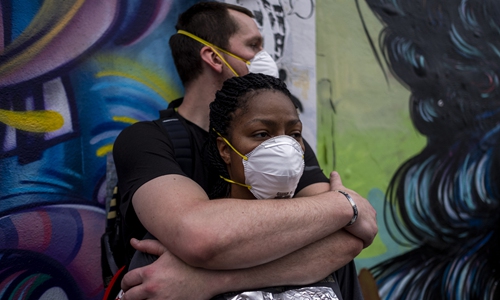US minorities and poor stuck in dead end of social sickness
By Dennis Etler Source:Global Times Published: 2020/6/4 22:58:40

Protestors embrace during a rally in response to the recent death of George Floyd in Miami, Florida on Tuesday. Photo: AFP
What is happening in the US did not come out of the blue.America is a sick society, in more ways than one. The spread of the COVID-19 epidemic was not a fluke and not President Donald Trump's fault alone. For generations, the US health care system has not adequately served the majority of Americans. Even before the novel coronavirus spread, Americans were afflicted with a bevy of diseases caused by poor diet and other preventable factors. Obesity, diabetes, hypertension, and other diseases had already reached epidemic proportions. Many of the elderly were shunted off to nursing facilities to wait out their final days.
US' long-neglected minorities have been especially vulnerable. Native Americans, blacks, and Latinos have the worst health outcomes, on a par with emerging nations, while working-class whites are not far behind. Hospitals have been privatized and many communities lack any sort of primary health care, so when sickness or injury occurs they must rely on local emergency rooms for rudimentary care. All these got compounded when the pandemic struck. Advisory bodies had warned of the potential for a pandemic wreaking havoc on the US health care system, and their dire predictions came true, with minorities, the elderly, and the poor being the primary victims.
But the sick society has even deeper roots. Racism and poverty are endemic and even after over 50 years of attempts at remediation very little has changed. Still today, the poverty rate hovers at about 12 percent, but the majority of Americans of all backgrounds live paycheck to paycheck, with hardly enough money to pay for a $400 emergency.
Black and Latino communities are ravaged by high rates of un- and under-employment. Minority youth receive an inferior education with resources siphoned off to the wealthier suburbs, leaving them unprepared for the job market and having low-end, dead-end jobs. The attraction of easy money from selling drugs that serve as a palliative for the trauma of living in communities ravaged by poverty and addiction is too great a temptation for many, resulting in one-third of minority men facing incarceration and a lifetime of discrimination as a convicted felon.
Minority communities are occupied territory with the police acting as local bullies, terrorizing the black community with wanton violence. So add a pervasive social sickness to the health crisis that pervades American society.
An economic crisis brought about by COVID-19 has exposed the underlying weakness of the American economy, characterized by extreme wealth disparities and a lack of well-paying jobs. Many white youths, burdened with exorbitant loans for their college education find themselves with no other work than service jobs of one sort or another, with low pay and few if any benefits
On top of it all, the ruling elites in the US can find all the money they need for armaments and military adventures abroad and more than enough money to bail out corporate America and billionaire moguls, but ironically not enough to rebuild a decrepit infrastructure or fund basic social services.
All these underlying tensions exploded with the brutal police murder of George Floyd. The visceral rage that people of all backgrounds held within them boiled over. After months of social isolation and economic deprivation, people erupted, shouting "I can't breathe" - a primal scream that reflects not just George Floyd's final exclamation, but the feelings of abandonment and oppression felt by millions of Americans.
The old America of racial inequality and capitalist exploitation at home and imperialist aggression abroad has come to a tipping point. But out of its current dystopia what will emerge? What will the birth pangs of a new society produce? That is the question that all Americans must now face.
The author holds a doctorate in anthropology from the University of California, Berkley, and conducted archaeological and anthropological research in China throughout the 1980s and 1990s and taught at the college and university level for over 35 years. opinion@globaltimes.com.cn
RELATED ARTICLES:
Posted in: VIEWPOINT,OPINION